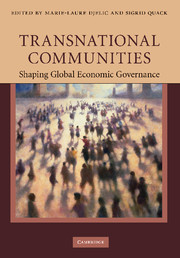Book contents
- Frontmatter
- Contents
- List of figures
- List of tables
- List of appendices
- Contributors
- Preface
- Part I Introduction
- 1 Transnational communities and governance
- 2 Global structures: markets, organizations, networks – and communities?
- Part II Classical communities with a transnational extension
- Part III Professional communities with a transnational extension
- Part IV Virtual communities
- Part V Transnational interest- or issue-based communities
- Part VI Conclusion
- Index
- References
2 - Global structures: markets, organizations, networks – and communities?
Published online by Cambridge University Press: 07 September 2010
- Frontmatter
- Contents
- List of figures
- List of tables
- List of appendices
- Contributors
- Preface
- Part I Introduction
- 1 Transnational communities and governance
- 2 Global structures: markets, organizations, networks – and communities?
- Part II Classical communities with a transnational extension
- Part III Professional communities with a transnational extension
- Part IV Virtual communities
- Part V Transnational interest- or issue-based communities
- Part VI Conclusion
- Index
- References
Summary
Community and globalization: diverging perspectives
In discussions of globalization, in which the evolving structures that transcend the boundaries of nation-states are the focus, markets, organizations, and networks predominate. Economic globalization takes place through the (potentially) worldwide expansion of markets and the growth of transnational corporations (TNC), facilitated by the international expansion of communication and transportation networks. Political globalization – that is, global governance – involves the multiplication of international governmental and non-governmental organizations. The existence of global production networks and global public policy networks completes the inventory of social forms with transnational territorial scope. Transnational communities do not play a significant role in the discussion on global structures. In the International Encyclopedia of the Social and Behavioral Sciences, the term “global community” does appear (for example, on page 2383), but there is no specific entry. It seems that the theoretical approaches that dominate the study of globalization direct attention selectively to markets, organizations, and networks, neglecting other kinds of social collectives extending beyond national boundaries, such as communities. This does not mean that the phenomenon is not being observed, as the chapters in this book also demonstrate. The role of legal professionals in transnational law-making has been studied (Quack 2007), scientific communities of varying geographical expansion are studied in the sociology of science, transnational communities of discourse are a topic in cultural studies (see Plehwe in this volume), and relevant contributions can also be found in research on migration.
- Type
- Chapter
- Information
- Transnational CommunitiesShaping Global Economic Governance, pp. 37 - 54Publisher: Cambridge University PressPrint publication year: 2010
References
- 10
- Cited by



